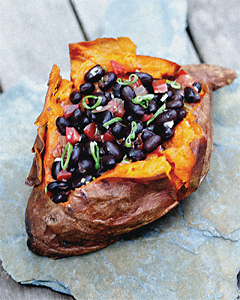
First, seventy-two labors brought us this food;
We should know how it comes to us.
—Zen meal gatha (verse)
We’ve all heard by now about the industrial feedlots that figure into the “farm-to-fork” commercial food chain. We’ve also heard about meat and produce being tainted with E. coli and salmonella. But for how long can we keep these things in mind with the multiple demands lay life imposes on us—especially when it’s so cheap, easy, and convenient to eat all the wrong things?
What we choose to eat affects our health, our environment, and the lives of countless others. And though we’re aware of this—if only dimly in our busier moments—it’s fair enough to say that our world isn’t set up to help us make the right choices. You’ve probably discovered, as I have, that self-reproach and judgment of others are poor strategies. But what I’ve also discovered is a strategy that does work: Learn how to make dinner!
Before I start, I consider four things:
Time
Who doesn’t live a busy life nowadays? Whether it’s longer hours at work, the kids, social and professional commitments, taking thirty minutes—let alone an hour—after work to put a meal together can feel like Herculean labor. Meals today have to be quick and easy to prepare if we’re going to commit to eating right.
Health
With all the fads, food additives, genetic modifications, processing, and E. coli outbreaks, what are the safest and healthiest foods to eat?
Affordability
For most of us, a cost-of-living increase is not an option. Organic food can be two to three times more costly than nonorganic. Wit that in mind, how can we buy the best quality at a reasonable price?
Responsibility
How do my choices affect others? Who brought me this food? How does it affect others and the environment? How much pesticide and fertilizer did it take to produce this? How much needless packaging was involved? And so forth.
Here’s a recipe that keeps all four of the above suggestions in mind. It’s made from organic ingredients you can buy at affordable prices, and every item can be bought online, at a farmer’s market, or from an organic food store, saving you time. (See below.) When I use meat products, they come from animals treated humanely, and for vegetarians I offer substitutes. Of course, growing vegetables in your garden is an ideal way to supplement your diet if you have the time and inclination, but for many of us this isn’t an option.
You can eat well, affordably, and responsibly—and you do have the time!
Dinner, Quick & Mindful
Sweet Potatoes with Black Bean Salad (Serves 4)
Ingredients
4 medium sweet potatoes
2 Tbsp. extra-virgin olive oil
1/4 cup white onion, finely chopped
1/2 stalk celery, peeled and finely chopped
1 medium tomato, diced
2 Tbsp. apple cider vinegar
1 tsp. ground cumin
1/2 tsp. fennel pollen (or ground toasted fennel seed)
3/4 tsp. salt
1/4 tsp. ground black pepper
1 15-ounce can black beans, rinsed
1/4 cup loosely packed cilantro, finely chopped
Garnish: sliced scallions
1. Set oven to 425 degrees. Prick sweet potatoes with a fork in several places. Wrap potatoes in foil and bake until tender, around 45 minutes.
2. In a medium frying pan, sauté onion and celery until soft but not browned, about a minute. Combine beans, tomatoes, vinegar, cumin, fennel, salt, pepper, and beans. Warm this until just heated through, about 5 minutes. Add cilantro to the bean mixture and mix thoroughly.
3. Slash each sweet potato lengthwise and press inward and slightly upward at both ends to make a well in the center of the potato. Spoon the bean mixture into the well. Garnish with sliced scallions.
Make Cooking Healthy Meals at Home Easier:
Shop for Meat and Produce online
Fresh Direct
www.freshdirect.com
Spud
www.spud.com
Heritage Foods USA
www.heritagefoodsusa.com
Local Harvest
www.localharvest.org
Diamond Organics
www.diamondorganics.com
Organic Kingdom
www.organickingdom.com
Azure Standard
www.azurestandard.com
Green Shopper
www.greenshopper.com